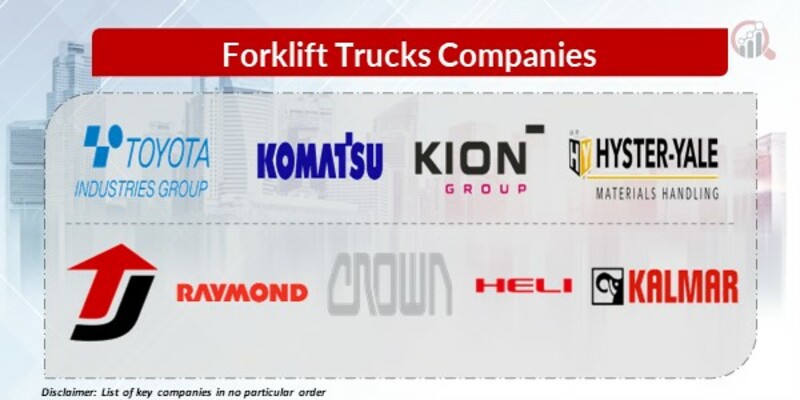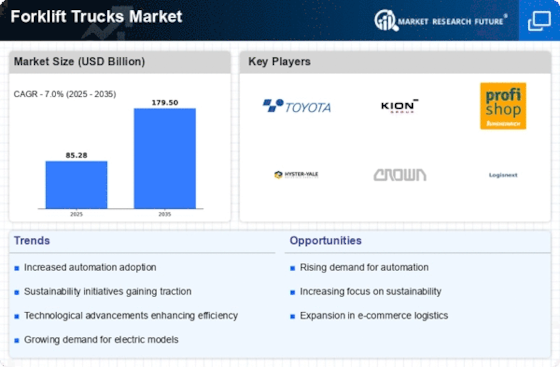Top Industry Leaders in the Forklift Trucks Market

Forklift Trucks Market
The forklift truck market is a crucial cog in the global supply chain, facilitating the movement of goods across industries. But beneath this seemingly stable surface lies a dynamic landscape of fierce competition, evolving technologies, and shifting market trends. Let's delve into this complex ecosystem, exploring the strategies adopted by key players, the factors influencing market share, and the latest developments shaping the future of this vital industry.
Strategies Driving Market Share:
-
Product Diversification: Leading players like Toyota, Kion Group, and Jungheinrich are expanding their offerings beyond traditional internal combustion engine (ICE) models, embracing electric, hybrid, and autonomous forklifts to cater to diverse customer needs and environmental regulations. -
Technological Innovation: Investing in automation and advanced features like lithium-ion batteries, regenerative braking, and AI-powered safety systems is a key differentiator. Companies like Hyster-Yale and Mitsubishi Logisnext are leading the charge in this space. -
Geographic Expansion: Emerging markets in Asia and Latin America present lucrative opportunities for growth. Established players are setting up production facilities and distribution networks in these regions to capitalize on the rising demand. -
Focus on Aftermarket Services: Providing comprehensive maintenance, repair, and parts supply services is crucial for customer retention and loyalty. Companies like Linde Material Handling are building robust service networks to ensure maximum uptime for their customers' fleets. -
Partnerships and Acquisitions: Strategic collaborations and acquisitions are enabling companies to expand their product portfolios, access new technologies, and gain market share. An example is the recent acquisition of Baoli Forklifts by Kion Group, solidifying their presence in the Chinese market.
Factors Influencing Market Share:
-
Fuel Prices and Environmental Regulations: The rising cost of fossil fuels and stricter emission regulations are driving the adoption of electric forklifts, benefiting companies like BYD and Crown Equipment Corporation. -
E-commerce Boom: The surge in online shopping is fueling demand for automation and efficient material handling solutions, creating opportunities for companies specializing in automated guided vehicles and warehouse management systems. -
Supply Chain Disruptions: The ongoing global supply chain disruptions are impacting raw material availability and component production, leading to price fluctuations and delivery delays. Companies with strong supplier relationships and flexible manufacturing capabilities are better positioned to navigate these challenges. -
Labor Market Dynamics: The tightening labor market and rising labor costs are prompting businesses to invest in automation solutions, including autonomous forklifts, to improve efficiency and reduce dependence on manual labor.
Industry News and Market Summary:
March 2022: Kalmar cooperated with Pfeifer Holding GmbH to offer three Kalmar medium electric forklift trucks to support the company's sustainability agenda.
February 2022: The KION Group initiated the IMOCO European research initiative. The project aims to develop intelligent forklift trucks traveling autonomously within a factory or warehouse.
December 2021: Wolter Group LLC announced the acquisition of A D Lift Truck, a privately held material handling and forklift company. The acquisition broadens the company's offering of gas & electric forklifts.











